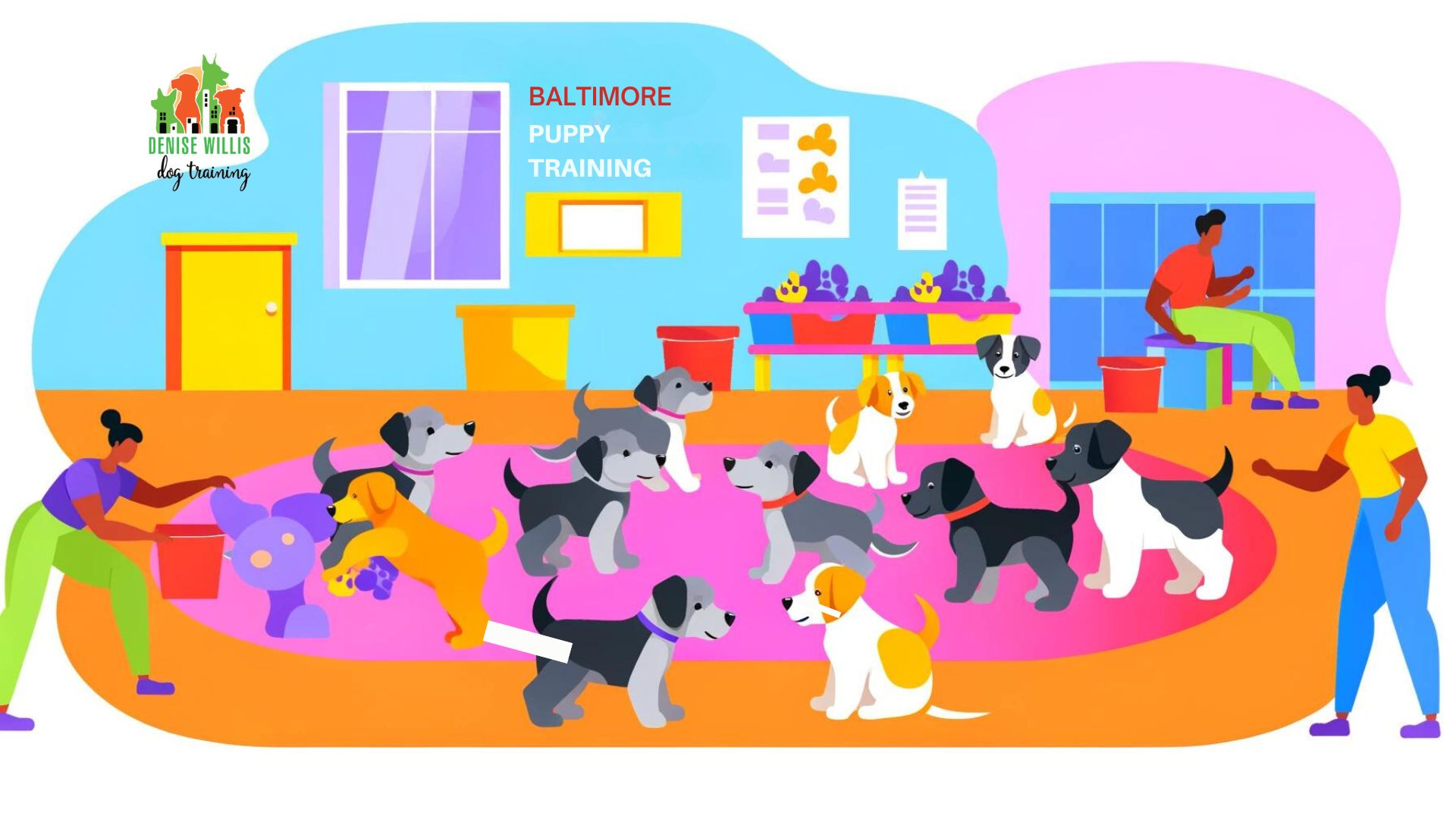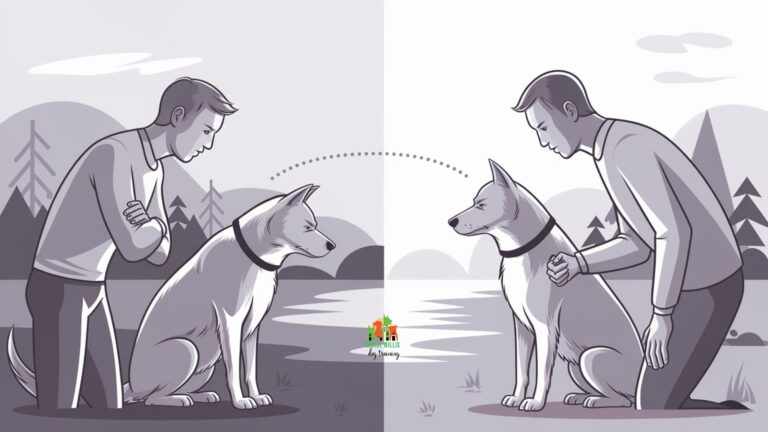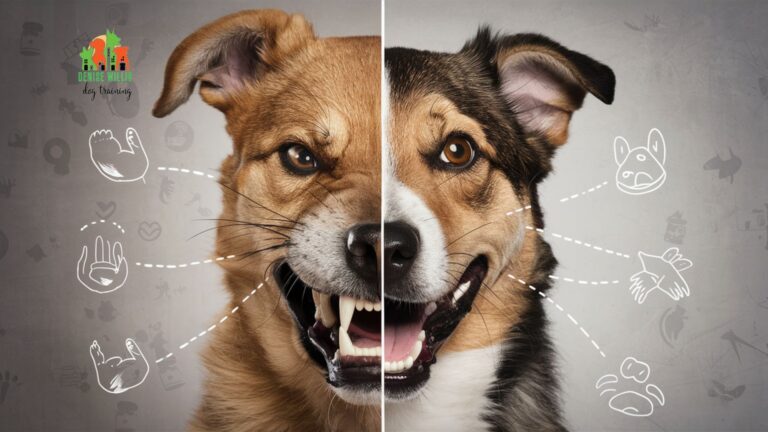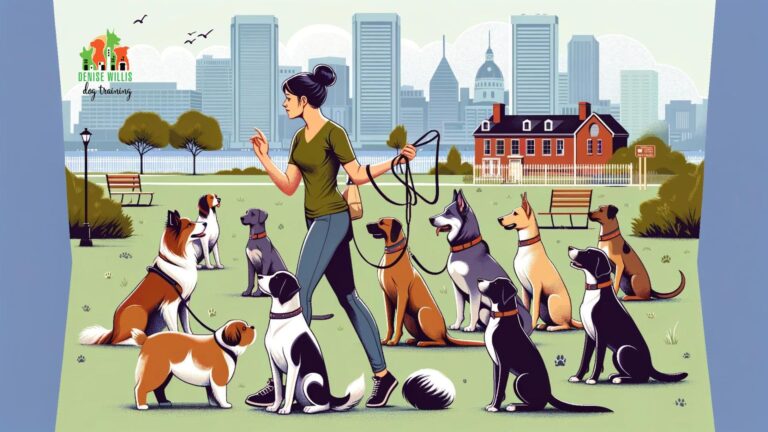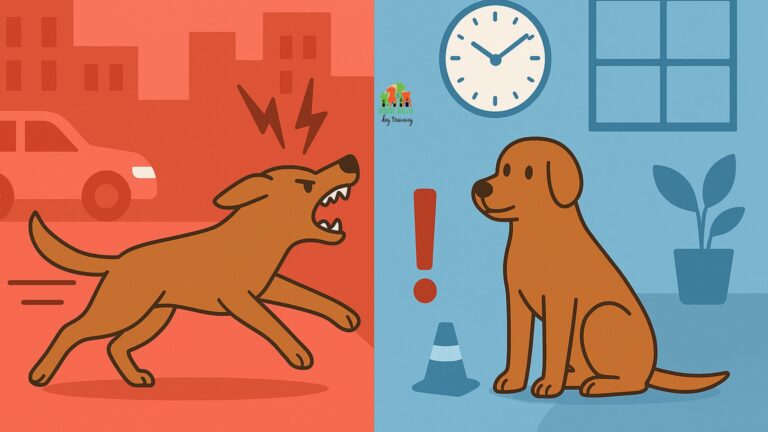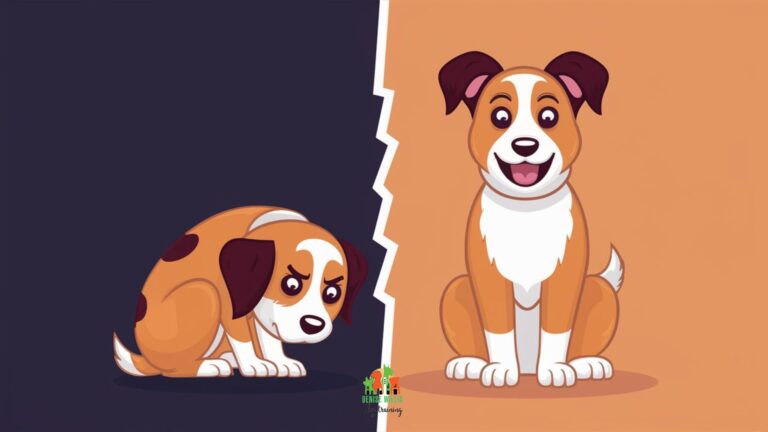Puppy Training Classes in Baltimore: Find the Best Fit for Your Furry Friend
📍 Service Area Notice: DW Dog Training provides in-person training services exclusively in the Greater Baltimore area. While our blog content is designed to help dog owners internationally, our hands-on training services are locally focused. For readers outside our service area, we hope you find value in our articles and welcome you to reach out with questions!
Picture this: you’ve just brought home an adorable, wriggly bundle of joy – your new puppy! You’re excited to start this journey together, but then reality sets in. Chewed shoes, unexpected “presents” on the carpet, and a tiny terror terrorizing your ankles. It’s enough to make any new puppy parent question their sanity. But fear not! The solution to your puppy woes is simple: professional puppy training classes.
Enrolling in puppy training classes is one of the best investments you can make for your furry friend. Not only do these classes provide a solid foundation for a well-behaved adult dog, but they also offer numerous benefits such as socialization, expert guidance, and a stronger bond between you and your pup. Plus, early training can help reduce the risk of surrendering dogs to shelters due to behavioral issues and improve the overall quality of life for both you and your four-legged companion.
Why Puppy Training Classes Are Worth the Investment
“But wait,” you might be thinking, “my puppy is fine at home. Why should I shell out the cash for classes?” Well, my friend, let me tell you a little story. When I first got my German Shepherd puppy, I thought I could handle the training myself. Fast forward a few weeks, and I was ready to pull my hair out. That’s when I decided to enroll in puppy training classes, and it was a game-changer.
Here’s why puppy training classes are worth every penny:
- Socialization: Puppies have a critical socialization period between 3-16 weeks. During this time, it’s crucial to expose them to a variety of people, animals, and environments to help them grow into confident, well-adjusted adult dogs. Puppy classes provide a safe, controlled setting for your pup to interact with other dogs and people.
- Early intervention: Professional trainers have a keen eye for spotting potential behavioral issues early on. By addressing these concerns in puppyhood, you can prevent them from becoming more serious problems down the road.
- Stronger bond: Training together helps establish clear communication and trust between you and your puppy. Think of it as building a solid foundation for a lifelong friendship.
- Prevention: Investing in training now can save you a lot of headaches (and money) in the future. A well-trained dog is less likely to engage in destructive behaviors or develop aggression issues that may require costly professional intervention later on.
Table 1: Puppy Training Milestones
| Age | Milestone | Skills to Focus On |
| 8-16 weeks | Socialization | Exposure to new people, animals, and environments; basic obedience (sit, down, come) |
| 4-6 months | Impulse Control | Leash walking, wait, stay, leave it, drop it |
| 6-12 months | Advanced Obedience | Heel, place, recall, distance commands |
| 1-2 years | Ongoing Training | Maintaining skills, learning new tricks, addressing any behavioral issues |
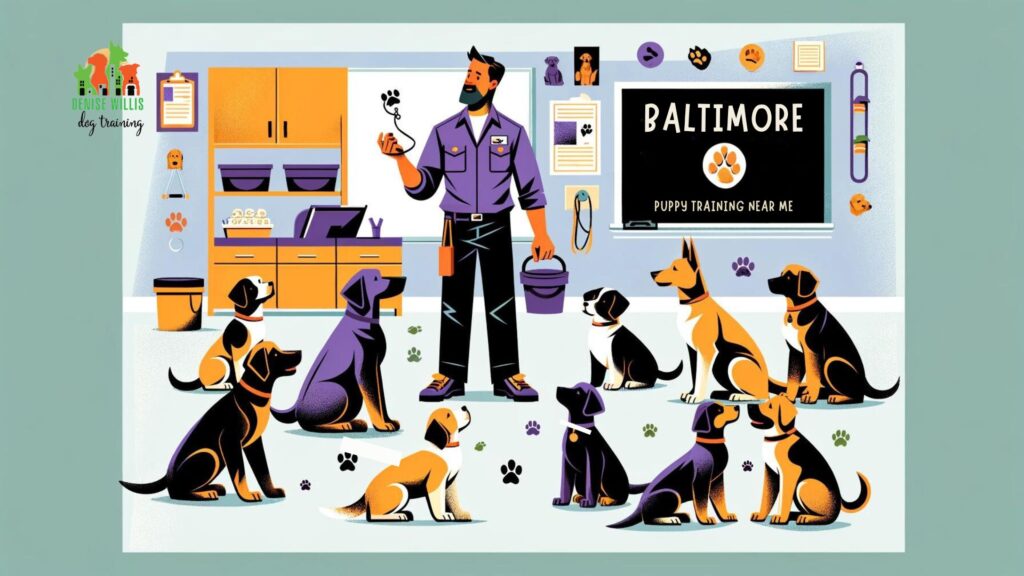
Choosing the Right Puppy Class
Now that you’re convinced puppy classes are the way to go, you might be overwhelmed by the sheer number of options available. Don’t worry; we’ve got you covered. Here are some key factors to consider when choosing the perfect class for your pup:
- Training methods: Look for trainers who use positive reinforcement and science-based methods. Avoid anyone who advocates for harsh corrections or punishment-based techniques.
- Class size: Smaller classes mean more individual attention for your puppy. Ideally, look for classes with no more than 6-8 puppies per instructor.
- Age and skill focus: Make sure the class is appropriate for your puppy’s age and skill level. “Puppy kindergarten” classes are perfect for young pups just starting, while basic obedience classes cater to slightly older puppies ready for more advanced training.
- Instructor credentials: Don’t be afraid to ask about the instructor’s certifications and experience. A reputable trainer will be happy to share their qualifications and expertise.
- Location and convenience: Consider the class location and schedule. You’ll be more likely to stick with the training if it’s easy to fit into your routine.
- Class duration and frequency: Weekly classes are ideal for most puppies, but some may benefit from more intensive courses. Consider your puppy’s learning style and your own schedule when choosing a class format.
- Cost and value: While it’s essential to stay within your budget, remember that investing in quality training now can save you money in the long run by preventing future behavioral issues.
Top-Rated Puppy Training Providers in Baltimore
“Okay,” you might be thinking, “I’m ready to sign up for classes. But where do I even start looking?” Fear not, dear reader! As a proud Baltimore resident and experienced dog trainer, I’m here to help.
At DW Dog Training, we pride ourselves on providing top-notch puppy training services tailored to your individual needs. Our experienced trainers use positive, science-based methods to help your puppy learn essential skills and grow into a well-behaved adult dog. Plus, we offer a variety of class formats to fit your schedule and budget, from in-home private lessons to group classes and even board-and-train programs.
But don’t just take my word for it – here’s what some of our satisfied clients have to say:
“Denise did everything she promised and more. I can’t say enough great things about her. In only a month, she transformed my dog. Also, she makes the training easy to do for the average dog owner. Can’t recommend her services highly enough.”
Brian K. Google
“I adopted a teenage puppy who had lots of leash reactivity and lots of pulling. Denise was the 2nd trainer we worked with and since working with Denise, he’s made huge progress! He would lunge and bark at everything from a cart to a recycle bin to a tall branch hanging over the fence. After determining the right tool that worked for me and him, and working through some of my own anxieties with him, I feel more confident walking him and he is much easier to handle. Me and him still have work to do, (practice makes perfect!) but I feel like I can breathe when I take him out of my house and I no longer worry about the big feelings and reactivity that he had towards any and everything. Thanks to Denise, my teenage puppy might just make it to his human sports events one day!”
Jennifer N. Google
Of course, DW Dog Training isn’t the only game in town. When searching for puppy classes in Baltimore, be sure to read reviews on Google and independent dog training websites to find the best fit for you and your pup.
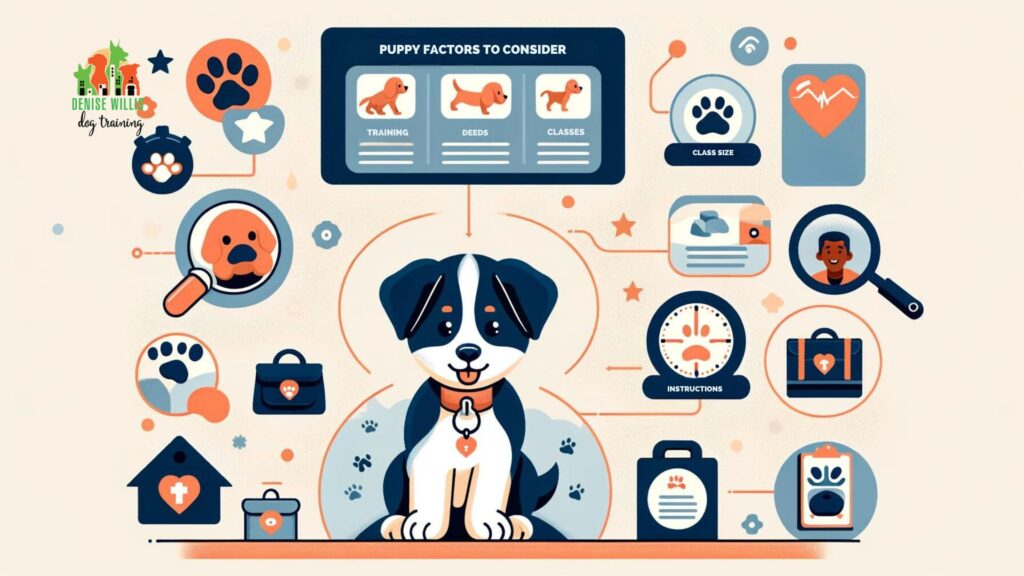
What to Expect in a Puppy Class
Alright, you’ve chosen a class and signed up. But now, you might be feeling a little nervous about what to expect. Relax – you’ve got this!
A typical puppy class will start with some basic obedience exercises like sit, down, and come. The instructor will demonstrate each skill and then give you time to practice with your puppy, offering guidance and feedback along the way. Don’t worry if your pup isn’t perfect at first – that’s what the classes are for!
In addition to obedience training, most puppy classes also include supervised playtime and socialization. This is a chance for your pup to interact with other puppies in a safe, controlled environment while learning valuable social skills like bite inhibition and appropriate play.
Throughout the class, the instructor will provide tips and tricks for continuing your puppy’s education at home. They’ll also be available to answer any questions you might have about your puppy’s behavior or development.
By the end of the course, you can expect your puppy to have a solid foundation in basic obedience and socialization. But remember – training is an ongoing process. Consistency and practice at home are key to helping your puppy grow into a well-behaved adult dog.
Table 2: Puppy Training Essentials Checklist
| Essential Item | Purpose |
| High-value treats | Rewarding and motivating your puppy during training |
| Comfortable leash and harness | Ensuring safe and secure leash walking |
| Puppy-safe chew toys | Providing appropriate outlets for chewing and mental stimulation |
| Puppy gates or playpens | Managing your puppy’s environment and preventing unwanted behaviors |
| Enzymatic cleaner | Cleaning up accidents during housetraining |
| Clicker (optional) | Marking desired behaviors during training |
Tips for Success Before, During, and After Classes
So, you’re ready to embark on this puppy training adventure. Here are some tips to help you make the most of the experience:
Before classes:
- Start with some basic training at home, like teaching your puppy their name and simple cues like sit and down.
- Socialize your puppy by exposing them to different people, animals, and environments in a positive way.
- Make sure your puppy is up-to-date on vaccinations and health check-ups before attending group classes.
During classes:
- Bring plenty of high-value treats and a comfortable leash and harness.
- Be patient and positive – remember, your puppy is learning!
- Don’t be afraid to ask the instructor questions or for extra help if you need it.
- Practice consistently at home between classes to reinforce your puppy’s new skills.
After classes:
- Continue socializing your puppy and exposing them to new experiences.
- Keep training sessions short, fun, and rewarding.
- Be consistent with your expectations and rules.
- If you run into any roadblocks or challenges, don’t hesitate to reach out to your trainer for guidance.
Some common mistakes to avoid:
- Inconsistency: Make sure everyone in the household is on the same page with training and expectations.
- Expecting too much too soon: Training takes time and patience. Celebrate your puppy’s progress, no matter how small.
- Punishing mistakes: Focus on reinforcing good behavior rather than punishing mistakes. Positive training methods are more effective and less likely to damage your bond with your puppy.
Key Takeaways
- Puppy training classes are essential for socialization, obedience, and preventing future behavioral issues.
- Choose a class based on factors like training methods, class size, instructor credentials, and convenience.
- DW Dog Training offers top-rated puppy training services in Baltimore.
- Expect a fun, supportive atmosphere in classes and consistent progress with practice.
- Success in training requires preparation, consistency, and addressing challenges as they arise.
Frequently Asked Questions
- At what age should I start puppy training classes? The ideal age to start puppy training classes is between 8-16 weeks, after your puppy has received their first round of vaccinations.
- How long do puppy training classes typically last? Most puppy training courses run for 6-8 weeks, with one class per week lasting around an hour.
- Are group classes or private lessons better for my puppy? Group classes are great for socialization and learning basic obedience, while private lessons can be helpful for addressing specific behavioral concerns or for puppies who may be overwhelmed in a group setting.
- What should I bring to my puppy’s first training class? Bring plenty of high-value treats, a comfortable leash and harness, and any paperwork required by the training facility (like proof of vaccinations).
- How can I continue training my puppy at home between classes? Practice short, frequent training sessions throughout the day, focusing on the skills learned in class. Keep sessions fun and rewarding, and be consistent with your expectations and rules.
Final Thoughts
Puppy training classes are a fun, rewarding way to bond with your new furry friend while setting them up for success as a well-behaved adult dog. By choosing the right class and staying consistent with training, you’ll be amazed at the progress you and your puppy can make together.
Remember, training is a lifelong journey. As your puppy grows and develops, their needs and abilities will change. But with the foundation you’ve built in puppy classes and the support of a trusted trainer like those at DW Dog Training, you’ll be ready to tackle any challenges that come your way.
So, what are you waiting for? Sign up for a puppy training class today and get ready to embark on the ultimate adventure with your four-legged best friend. Trust me – you won’t regret it!

